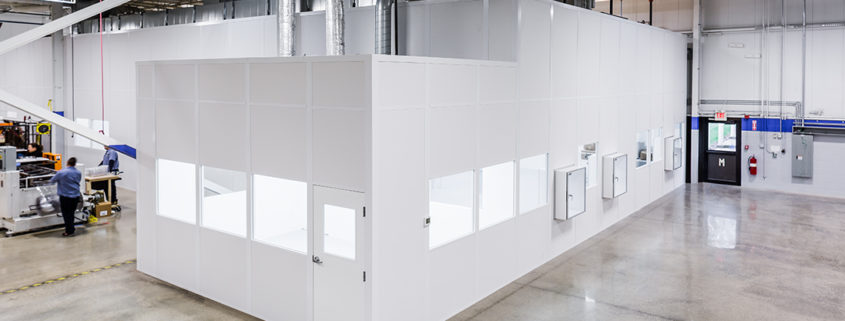Cleanroom Standards and Guidelines
Cleanroom Classifications are based on a specific set of standards. These cleanroom classifications or “cleanroom standards” are numbered according to three primary areas of interest:
- Number of particles in the cleanroom air/environment
- Size of the particles allowed in the cleanroom environment
- Total cubic ft. of air circulation in the cleanroom environment
While it may seem that these three criteria are relatively straightforward, it is actually a process that starts (and finishes) on a microscopic level. To make things even more difficult, different industries may require different default cleanroom standard start points. For example, the existing air quality and what is considered a base threshold in a factory may vary greatly from what is considered a base set point in a hospital or compounding pharmaceutical manufacturer.
Below is a standard cleanroom classification chart. Depending on the industry, the ISO requirement may differ greatly.
| ISO 14644-1 Cleanroom Standards | |||||||
|
Class |
maximum particles / m3 |
FED STD 209E |
|||||
|
≥0.1 µm |
≥0.2 µm |
≥0.3 µm |
≥0.5 µm |
≥1 µm |
≥5 µm |
||
|
ISO 1 |
10 |
2.37 |
1.02 |
0.35 |
0.083 |
0.0029 |
|
|
ISO 2 |
100 |
23.7 |
10.2 |
3.5 |
0.83 |
0.029 |
|
|
ISO 3 |
1,000 |
237 |
102 |
35 |
8.3 |
0.29 |
Class 1 Cleanroom |
|
ISO 4 |
10,000 |
2,370 |
1,020 |
352 |
83 |
2.9 |
Class 10 Cleanroom |
|
ISO 5 |
100,000 |
23,700 |
10,200 |
3,520 |
832 |
29 |
Class 100 Cleanroom |
|
ISO 6 |
1.0×106 |
237,000 |
102,000 |
35,200 |
8,320 |
293 |
Class 1,000 Cleanroom |
|
ISO 7 |
1.0×107 |
2.37×106 |
1,020,000 |
352,000 |
83,200 |
2,930 |
Class 10,000 Cleanroom |
|
ISO 8 |
1.0×108 |
2.37×107 |
1.02×107 |
3,520,000 |
832,000 |
29,300 |
Class 100,000 Cleanroom |
|
ISO 9 |
1.0×109 |
2.37×108 |
1.02×108 |
35,200,000 |
8,320,000 |
293,000 |
Room air |
(µm denotes micron particle size)
Cleanrooms are divided up or given “cleanroom standards” based on particulate count. For example, with Class 100 Clean Rooms, they are designed to never allow more than 100 particles (0.5 microns or larger) per cubic foot of air.
Cleanroom Certifications
Clean rooms must be periodically certified/re-certified by a cleanroom ISO certification specialist. Most companies have their modular, hard wall clean room or softwall clean room certified for ISP cleanroom compliance once per year. Some pharmaceutical companies, or USP certified cleanrooms are certified once every 6 months. Aside form annual or bi-annual cleanroom cersifications, a re-certification is necessary if there is a cleanroom contamination event.
Typically, a classification specialist will check for these requirements:
- Class 100-100k, ISO4-8
- Per ISO 14644-1, ISO14644-2, and FS209E
- Using NIST traceable calibrated instruments
- Particle count
- Room differential air pressure
- Temperature
- Humidity
- Detailed test report with data map
- Mountable inspection certificate
- Individual HEPA FFU air flow w Velgrid (must be requested at time of quote)
For particle count, a benchtop particle counter is more accurate than a handheld option.
Once certified, it is up to the cleanroom operators to maintain environmental conditions inside the clean room.


